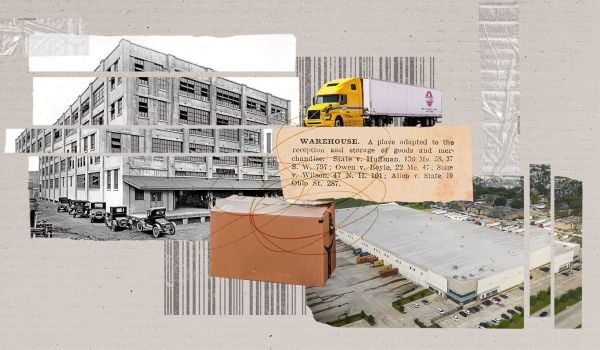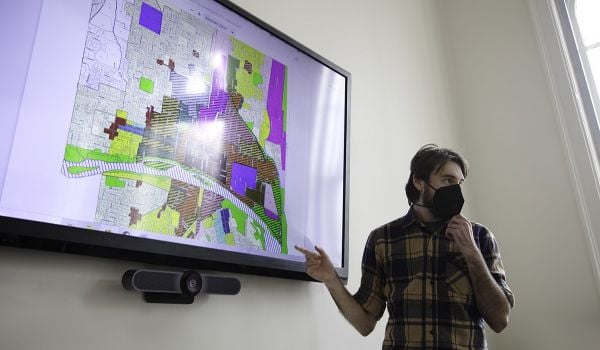The briefing is headlined in 24-point font, bold, and centered at the top of the page: “President Donald J. Trump is Tearing Down Red Tape in Order to Build More Affordable Housing.” At the end of June, the Trump administration did what it had been hinting it would do for some time — Trump signed an executive order creating a council charged with eliminating barriers to housing development. The council, chaired by HUD Secretary Ben Carson and consisting of representatives from eight federal agencies, would focus on changes to federal, state, and local policies and processes that would make affordable housing easier to build.
In some ways, the tone of the announcement is in harmony with that of the Yes In My BackYard (YIMBY) movement, with its focus on eliminating exclusionary zoning policies and creating the local conditions in which affordable-housing projects can be brought to completion as quickly and easily as possible. But, many prominent YIMBYs say, it’s a smokescreen. Zoning reform is only part of the equation, and Trump’s council is likely to make recommendations that are good for the real estate industry but bad for tenants and low-income homeowners, they say.
“I don’t trust the Trump administration, full stop,” says Jesse Kanson-Benanav, founder of the Boston-area YIMBY group A Better Cambridge. “I don’t believe that their focus on deregulation, even where it seems to rhetorically align at times with the YIMBY framework, I don’t believe that they’re in it for the social-justice reasons that those of us in the YIMBY movement are doing this work.”
If the administration is serious about creating affordable places to live in cities, it should go beyond deregulation and invest in public housing and subsidized affordable housing for renters, Kanson-Benanav says. And if it wanted to create inclusive cities, it wouldn’t have chosen to “reinterpret” the Affirmatively Furthering Fair Housing rule put forth by the Obama administration, which required governments to look at their own housing plans under the lens of undoing racial segregation.
It’s true that local zoning regulations are a barrier that restricts housing supply and perpetuates intentionally segregationist housing patterns, says Janne Flisrand, of Neighbors for More Neighbors, a group that has pushed to abolish single-family zoning in Minneapolis.
“It’s an important thing for everybody to say,” Flisrand says. “It doesn’t matter what your politics are, [single-family] zoning means we can’t have homes for everyone … But simply talking about one of the things that is currently politically popular to talk about, and that conveniently fits into a particular political model, is not enough. We need to do all the things.”
She continues, “We need people who are anti-racist developing policy throughout all of the issues that we’re struggling with in our country, and housing and zoning is one of those.”
After Trump’s announcement, the National Low Income Housing Coalition released a statement saying that the administration’s attention to zoning reform “would be welcomed if it weren’t belied by other actions to gut affordable and fair housing in America.” Diane Yentel, the president and CEO of NLIHC, tells Next City that she’s hopeful that candidates in the Democratic primary for president will develop more comprehensive solutions and foster a more productive conversation about national housing policy.
“I think in these early months of the campaign season, we’ve already heard affordable-housing policy talked about on the campaign trail more than we have in entire campaigns in the past,” Yentel says.
The candidates’ proposals take a range of approaches to making housing more affordable, from creating a tax credit for renters to assisting low-income homebuyers in formerly redlined communities. (Next City will have more on the Democratic candidates’ housing proposals later this year. In the meantime, NLIHC is tracking their policies and statements on a website called Our Homes, Our Votes.)
But Dianne Enriquez, director of the Opportunity Campaign at the Center for Popular Democracy, thinks candidates could spend even more time talking about housing. The Center has met with several campaigns to push them to include more progressive policies in their housing platforms, Enriquez says. One thing that hasn’t gotten much focus is regulating private equity firms that have bought up mobile-home parks and foreclosed loans across the country, she says. Beyond that, she says campaigns should be focusing on supporting local policies like tenant protections and investing in public and subsidized housing at the national level.
“If the Democatic Party has a chance to actually win in the next presidential election, this has to be a core issue that they have to lift up,” Enriquez says. “And it has to be from the perspective of the tenants, the low-income homeowners, and folks that live in public housing. It has to be the solutions that the leadership of these communities are lifting up.”
As far as Trump’s council goes, Enriquez says it looks like the goals are only to support the real-estate industry and not communities at risk of displacement.
Some YIMBYs agree. Overall, the national conversation about housing policy is headed in a positive direction, says Matthew Lewis, director of communications at California YIMBY. But the Trump administration’s attention to deregulating zoning won’t actually create any affordable housing, he says. Without new and substantial investments in public housing, and the expansion of rental vouchers, high-income earners are going to be first in line for all the new housing supply that gets created, Lewis says.
“Part of what we’re trying to do is make our cities welcoming to everybody,” Lewis says. “We believe that not just California cities but American cities are the places that people all around the world seek out for opportunity, so you can’t out of one side of your mouth say we’re going to make it easier for people to live in cities and out of the other side say we’re going to build a wall on the border.”
This article is part of Backyard, a newsletter exploring scalable solutions to make housing fairer, more affordable and more environmentally sustainable. Subscribe to our weekly Backyard newsletter.

Jared Brey is Next City's housing correspondent, based in Philadelphia. He is a former staff writer at Philadelphia magazine and PlanPhilly, and his work has appeared in Columbia Journalism Review, Landscape Architecture Magazine, U.S. News & World Report, Philadelphia Weekly, and other publications.
Follow Jared .(JavaScript must be enabled to view this email address)


















